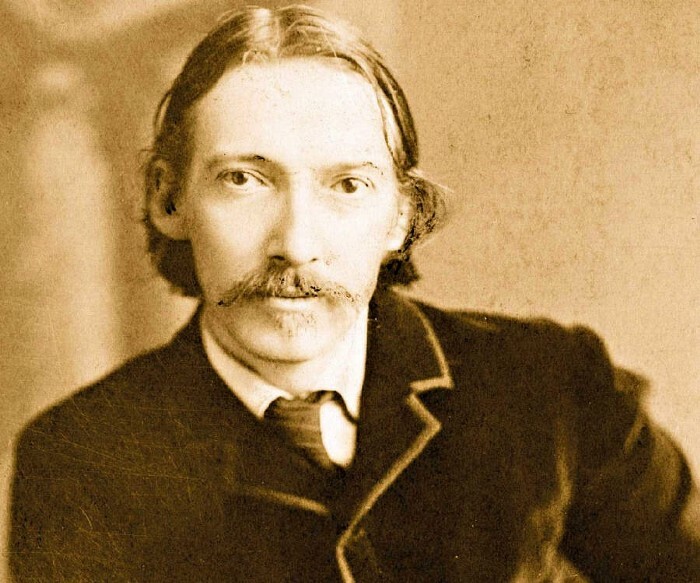
Introduction: An important question.
In 1887, Robert Louis Stevenson, the author of ‘Treasure Island’ and ‘The Strange Case of Dr. Jekyll and Mr. Hyde’ wrote an essay about the books and writers who influenced him, upon the request of the ‘British Weekly.’ In doing so, he found that the question that seemed so innocent on the surface had much greater depth.
The most influential books, and the truest in their influence, are works of fiction. They do not pin the reader to a dogma, which he must afterwards discover to be inexact; they do not teach him a lesson, which he must afterwards unlearn. They repeat, they rearrange, they clarify the lessons of life; they disengage us from ourselves, they constrain us to the acquaintance of others; and they show us the web of experience, not as we see it for ourselves, but with a singular change — that monstrous, consuming ego of ours being, for the nonce, struck out.
In this article, I am going to write about some of the books which influenced him, in the order that he mentioned them in his essay. For each, I will provide short biographical information, show their influence on Robert Louis Stevenson, often providing his own words, and I will end each section with a short example of their work.
Shakespeare — ‘Hamlet’ and ‘As You Like It’

William Shakespeare was born in 1564, in Stratford-upon-Avon. Playwright and poet, he wrote over 30 plays, 154 sonnets, and added 1700 new words to the English language. A contender for the most famous writer in history, 450+ years later his plays are still being performed regularly all over the world.
Robert Louis Stevenson mentions in his essay that few living friends have influenced him so much for good as Hamlet and Rosalind. Hamlet is one of the most complex and interesting characters in Shakespeare's canon. Brooding, melancholic, erudite. He is the subject of much character study and analysis and is an excellent example for all writers to consider when creating their own characters.
Stevenson goes on to mention that his love of the character Rosland, grew more delighted, more refreshed when he saw ‘As You Like It performed live. Shakespeare's plays are best seen in person, or through recordings, as this is how they were originally intended to be seen. My suggestion for those new to Shakespeare is to watch the BBC adaptation of Hamlet with Patrick Stewart and David Tennant.
Example — Hamlet:
To be, or not to be, that is the question:
Whether ’tis nobler in the mind to suffer
The slings and arrows of outrageous fortune,
Or to take arms against a sea of troubles
And by opposing end them. To die — to sleep,
No more; and by a sleep to say we end
The heart-ache and the thousand natural shocks
That flesh is heir to: ’tis a consummation
Devoutly to be wish’d. To die, to sleep;
To sleep, perchance to dream — ay, there’s the rub:
For in that sleep of death what dreams may come,
When we have shuffled off this mortal coil,
Must give us pause — there’s the respect
That makes calamity of so long life.
For who would bear the whips and scorns of time,
Th’oppressor’s wrong, the proud man’s contumely,
The pangs of dispriz’d love, the law’s delay,
The insolence of office, and the spurns
That patient merit of th’unworthy takes,
When he himself might his quietus make
With a bare bodkin? Who would fardels bear,
To grunt and sweat under a weary life,
But that the dread of something after death,
The undiscovere’d country, from whose bourn
No traveller returns, puzzles the will,
And makes us rather bear those ills we have
Than fly to others that we know not of?
Thus conscience doth make cowards of us all,
And thus the native hue of resolution
Is sicklied o’er with the pale cast of thought,
And enterprises of great pith and moment
With this regard their currents turn awry
And lose the name of action.
Michel de Montaigne — Essays of Montaigne
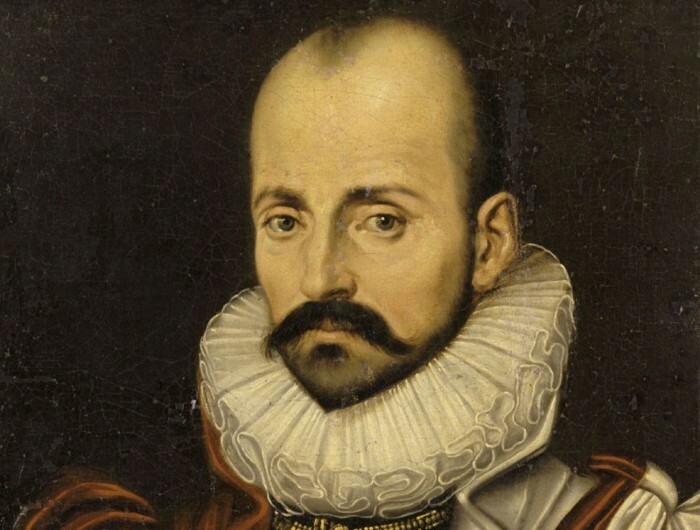
Michel de Montaigne was born in 1533 to wealthy parents and had all the advantages which that brings. Well educated at a prestigious boarding school, it is believed that Michel De Montaigne went on to study law, although many details of his life are still uncertain. In 1554 he received the appointment of councilor in the Parliament of Bordeaux; in 1559 he was at Bar-le-Duc with the court of Francis II, and in the year following he was present at Rouen to witness the declaration of the majority of Charles IX.
On the eve of his 38th birthday, Michel de Montaigne retired from public life, intending to devote his remaining years to reading and writing. In doing so he ends up creating his life's work, the ‘Essays of Montaigne’ often considered the birth of the personal essay. It has been described thus:
What he did, and what he had professed to do, was to dissect his mind, and show us, as best he could, how it was made, and what relation it bore to external objects. He investigated his mental structure as a schoolboy pulls his watch to pieces, to examine the mechanism of the works; and the result, accompanied by illustrations abounding with originality and force, he delivered to his fellow-men in a book. (From the preface)
All who write on Medium follow in the footsteps of this man, and these essays.
Example: Quotes from ‘Essays of Montaigne’
“I am afraid that our eyes are bigger than our stomachs, and that we have more curiosity than understanding. We grasp at everything, but catch nothing except wind.”
“It is a disaster that wisdom forbids you to be satisfied with yourself and always sends you away dissatisfied and fearful, whereas stubbornness and foolhardiness fill their hosts with joy and assurance.”
The Bible — New Testament according to St Matthew

Photo by Aaron Burden on Unsplash
Robert Louis Stevenson wrote:
I believe it would startle and move anyone if they could make a certain effort of imagination and read it freshly like a book, not droningly and dully like a portion of the bible. Anyone would be able to see in it those truths which we are all courteously supposed to know and all modesty refrain from applying.
Walt Whitman — Leaves of Grass
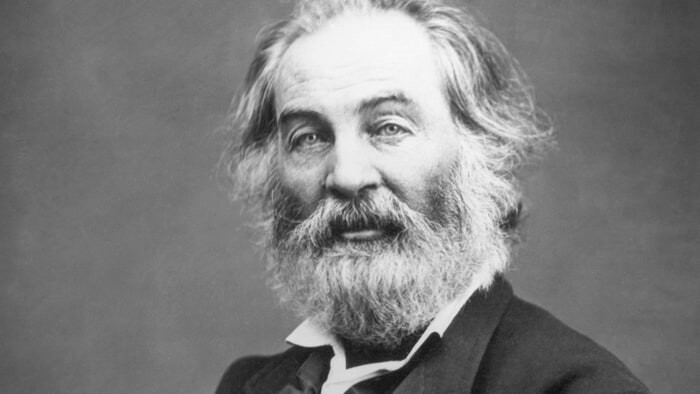
Born 1819, Walt Whitman spent time as a teacher, before becoming a journalist, founding and/or editing many newspapers. He later became a clerk in Washington DC, but that job was short-lived, and Walt Whitman fell on hard times, having now only his writing to support him. In 1955 he self-published his first edition of Leaves of Grass, then only containing 12 poems. The second edition in 1956 contained 33 poems, and he continued to add and revise throughout the rest of his life. The ‘deathbed’ edition of Leaves of Grass contains over 300 poems!
Walt Whitman’s Leaves of Grass inspired Robert Louis Stevenson for the same reason he inspires so many poets today — his uniqueness. Stevenson claims it
tumbled the world upside down for me, blew into space a thousand cobwebs of genteel and ethical illusion, and having thus shaken my tabernacle of lies, set me back again upon a strong foundation of all the original and manly virtues.
Example: Walt Whitman, Leaves of Grass — Song of Myself 1
I Celebrate myself, and sing myself,
And what I assume you shall assume,
For every atom belonging to me as good belongs to you.
I loafe and invite my soul,
I lean and loafe at my ease observing a spear of summer grass.
My tongue, every atom of my blood, form’d from this soil, this air,
Born here of parents born here from parents the same, and their parents the same,
I, now thirty-seven years old in perfect health begin,
Hoping to cease not till death.
Creeds and schools in abeyance,
Retiring back a while sufficed at what they are, but never forgotten,
I harbor for good or bad, I permit to speak at every hazard,
Nature without check with original energy.
Marcus Aurelius — Meditations
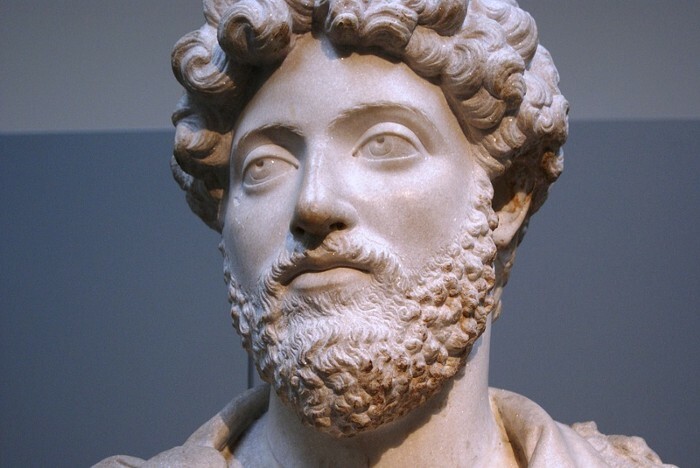
Born Second Century Roman Emporer and stoic philosopher, Marcus Aurelius wrote his Meditations when he was in his fifties, near the end of a military campaign. It was not written for publication, instead, like many have today, a personal journal, to hold reflections of his philosophical insights.
Scholars now generally agree (following Brunt 1974) that Marcus wrote for his own moral improvement, to remind himself of and render concrete the Stoic doctrines he wanted to live by, such as that the world is governed by Providence; that happiness lies in virtue, which is wholly in one’s own power; and that one should not be angry at one’s associates but regard them as siblings, offspring of the same God.
Robert Louis Stevenson was very inspired by this book. He writes:
The dispassionate gravity, the noble forgetfulness of self, the tenderness of others, that are expressed and were practiced on so great a scale in the life of its writer, make this book quite by itself. No one can read it and not be moved… there is another bond on you thenceforward, binding you to life and a love of virtue.
Example — Marcus Aurelius from Meditations
BEGIN thy morning with these thoughts: I shall meet the meddler, the ingrate, the scorner, the hypocrite, the envious man, the cynic. These men are such because they know not to discern the difference between good and evil. But I know that Goodness is Beauty and that Evil is Loathsomeness: I know that the real nature of the evil-doer is akin to mine, not only physically but in a unity of intelligence and in participation in the Divine Nature. Therefore I know that I cannot be harmed by such persons, nor can they thrust upon me what is base. I know, too, that I should not be angry with my kinsmen nor hate them, because we are all made to work together fitly like the feet, the hands, the eyelids, the rows of the upper and the lower teeth. To be at strife one with another is therefore contrary to our real nature; and to be angry with one another, to despise one another, is to be at strife one with another.
William Wordsworth
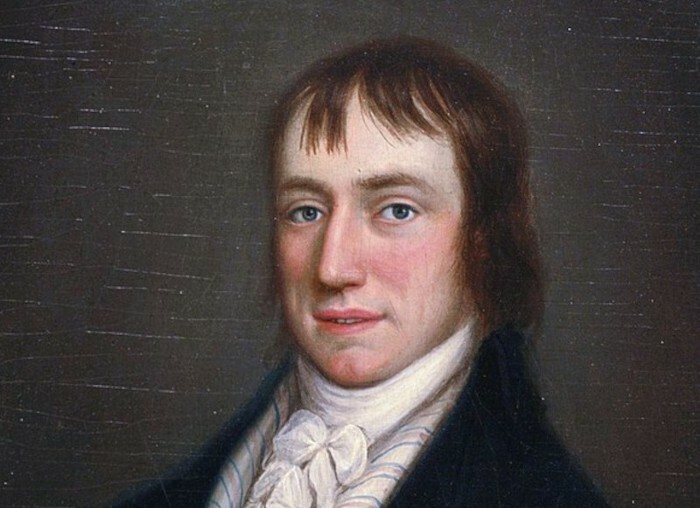
Born in 1770 in the picturesque lake district, Wordsworth lost both his mother and father at an early age. Inspired by nature, Wordsworth instigated the romantic movement in poetry along with Samuel Taylor Coldridge. He became Poet Laureate in 1843 until his death in 1850
Stevenson says of Wordsworth:
A certain innocence, a rugged austerity of joy, a sight of the stars, ‘the silence that is in the lonely hills,’ something of the cold thrill of dawn, cling to his work and give it a particular address to what is best in us.
Example: Wordsworth — I Wondered as Lonely as a Cloud
I wandered lonely as a cloud
That floats on high o’er vales and hills,
When all at once I saw a crowd,
A host, of golden daffodils;
Beside the lake, beneath the trees,
Fluttering and dancing in the breeze.
Continuous as the stars that shine
And twinkle on the milky way,
They stretched in never-ending line
Along the margin of a bay:
Ten thousand saw I at a glance,
Tossing their heads in sprightly dance.
The waves beside them danced; but they
Out-did the sparkling waves in glee:
A poet could not but be gay,
In such a jocund company:
I gazed — and gazed — but little thought
What wealth the show to me had brought:
For oft, when on my couch I lie
In vacant or in pensive mood,
They flash upon that inward eye
Which is the bliss of solitude;
And then my heart with pleasure fills,
And dances with the daffodils.
George Meredith — The Egoist
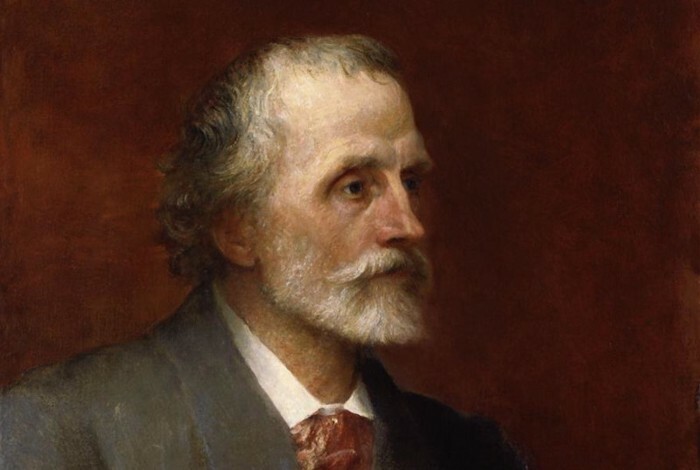
Born 1828, his mother died when he was five, and his father went bankrupt when he was nine. His first happiness was going to a German boarding school, where he discovered a love of poetry. His first poem was published in 1849, and he continued to prolifically write poetry and novels with varying levels of success for the rest of his life. For additional income, he became a ‘slush’ reader for the publisher Chapman and Hall around 1960, discovering many writers, including ‘Thomas Hardy’ His biggest success came later in life, with the satirical, comic novel, ‘The Egoist’ receiving critical acclaim in 1879 and Diana of the Crossways becoming a financial success in 1885, at the age of fifty-seven.
Robert Louis Stevenson was not a fan of satire, claiming it not to be great art, for it often shows the worst of people, rather than champion the good. He considered George Meredith’s satire in Egoist however to be different. Instead of attacking others,
It is yourself that is hunted down; these are your own faults that are dragged into the day and numbered, with lingering relish, with cruel cunning and precision.
Examples from The Egoist by George Meredith
She [Comedy] it is who proposes the correcting of pretentiousness, of inflation, of dulness, and of the vestiges of rawness and grossness to be found among us. She is the ultimate civilizer, the polisher, a sweet cook.
Comedy is a game played to throw reflections upon social life, and it deals with human nature in the drawing-room of civilized men and women, where we have no dust of the struggling outer world, no mire, no violent crashes, to make the correctness of the representation convincing.

Photo by Iñaki del Olmo on Unsplash
Final Thoughts
Robert Louis Stevenson ends his essay by discussing two intertwined subjects. The first was a discussion on the ‘improvable reader’ by which he means a person who has the ability to read and consider views opposite from their own without dismissing them out of hand.
If he has the gift of reading… they will see the other side of propositions and the other side of virtues. He need not change his dogma for that, but he may change his reading of that dogma, and he must supplement and correct his deductions from it… Something that seems quite new, or what seems insolently false or very dangerous, is the test of a reader. If he tries to see what it means, what truth excuses it, he has a gift, and let him read.
The second is that a person can only read (sadly) a limited number of books in their lifetime, with the ‘fittest lessons’ being the most palatable. Stevenson does not elaborate much further on that.
In consideration, I feel that we are influenced by the books we choose to read, and that is determined by what we are exposed to. Stevenson’s list includes no women, or persons of color, and considering the time period in which he lived, I would not expect it to. This doesn’t mean that his list should be discarded, that these books should no longer be read, or that they do not have value. Modern readers have access to more books, more diverse voices than ever before, and I feel if Robert Louis Stevenson were alive today, he would celebrate that.
If you enjoyed this article you might like to read:
In 1881 A Popular Author Warned Us About The Dangers Of Biased Media
Sources / Further Reading
Stevenson, R., 1905. Essays in the art of writing.
Williamshakespeare.net. 2021. William Shakespeare: 20 Facts, 37 Plays, 375 Poems, 100 Quotes & Bio. [online] Available at: <https://www.williamshakespeare.net/> [Accessed 9 December 2021].
Cotton, C. and Hazlitt, W., 2021. Essays of Michel de Montaigne. [online] Gutenberg.org. Available at: <https://gutenberg.org/files/3600/3600-h/3600-h.htm> [Accessed 9 December 2021].
Waltwhitman.com. 2021. Walt Whitman biography. [online] Available at: <https://waltwhitman.com/biography.jsp> [Accessed 9 December 2021].
Plato.stanford.edu. 2021. Marcus Aurelius (Stanford Encyclopedia of Philosophy). [online] Available at: <https://plato.stanford.edu/entries/marcus-aurelius/> [Accessed 9 December 2021].
World History Encyclopedia. 2021. Marcus Aurelius. [online] Available at: <https://www.worldhistory.org/Marcus_Aurelius/> [Accessed 9 December 2021].
Biography Online. 2021. William Wordsworth Biography |. [online] Available at: <https://www.biographyonline.net/poets/william-wordsworth.html> [Accessed 9 December 2021].
Victorianweb.org. 2021. George Meredith (1828–1909) — A BriefBiography. [online] Available at: <https://www.victorianweb.org/authors/meredith/biograph.html> [Accessed 9 December 2021].
